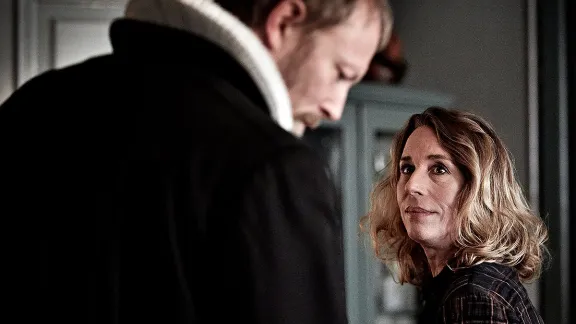
Herrens Veje is a Danish drama about the many facets of faith and meaning. Johannes Krogh (Lars Mikkelsen) is a dean in the church and a main character in the series. Elisabeth Krogh (Ann Eleonora Jørgensen) is his wife. Photo: DR1/Tina Harden
Approaching ethical discussion through popular culture
(LWI) A new drama series about the church has sparked broader discussion about faith and Christianity in Denmark.
Late last year the Evangelical Lutheran Church in Denmark (ELCD) was a big talking point in Denmark. It was a recurring subject of attention on the Danish Broadcasting Corporation because the channel premiered its new TV series, Herrens Veje (Ride upon the Storm).
The show was screened from September till November – and the Danish Broadcasting Corporation has already announced that Season 2 will premiere later in 2018. The dramatic lives of Dean Johannes Krogh and his family could be followed every Sunday during primetime by the entire nation and thus the TV show gave an impression of everyday life in the ELCD.
The Krogh family at the center of the series have been priests for more than 250 years. Johannes, the current head of the family, runs to become bishop of Copenhagen but narrowly loses the final vote. With this event as its point of departure, the family drama takes up existential themes such as grief, forgiveness, evil, love, hope, charity and faith.
The milieu of the ELCD is central to the story but in a heavily dramatized form. Hence, there has been debate whether the series provided a realistic portrayal of the ELCD. Could churchgoers and employees recognize themselves in the series? Either way, Herrens Veje has undeniably facilitated a broader discussion in society about faith, church and Christianity.
It tries to make us pose questions. Ought it to be this way or different?
Lars Mikkelsen, who has performed in international TV-series such as The Team, Sherlock and House of Cards, says that portraying the protagonist, dean Johannes Krogh, had a great impact on his own faith and emboldened him to be more open about his faith.
“Now I have the courage to say that I am a believer. All my life I was afraid to say it, because in a way it requires a certain degree of simplicity for modern man to say: “I believe.” And by saying so you write off your chances of being part of this highly intellectualized social setting that you are a part of when you are an actor or an artist,” Mikkelsen says to DR.
Ethical issues top the agenda
Bishop of Copenhagen, Peter Skov-Jakobsen, said Herrens Veje focuses on different ways of thinking about ethics, religion and faith, rather than on the church itself. “We are always in the public space, given that 75 percent of the population are members of the church. The church is just the setting for what is a drama series.”
He said Herrens Veje puts many ethical and human questions at the top of the agenda. For the most part, religion was discussed in good ways but the series is essentially about human life, faith, beliefs, ethics and modern society, addressing everything from sexuality to the right to kill in war.
However, it shows the church as a very human institution. “First and foremost, the question is why they have chosen to make places of faith the place to try to depict what is happening in Danish society these days. There are several ways you can look at that. There is a general interest in religion, what it means and where it should be in your life. Then at other times they also try to show that religion doesn’t mean you are not part of normal human ways of living.”
Many Danes were delighted to see the series, which as a dramatization doesn’t fully reflect the reality of the church. Danes were “certainly” discussing the ethical issues raised as a result of the series, he said.
The show was not so much about finding answers as it was asking questions. “It tries to make us pose questions. Ought it to be this way or different? You should lead people towards questions and give them a fundamental faith that could give some answers.”
Adapted from a news article published by the Council on International Relations of the Evangelical Lutheran Church in Denmark.


